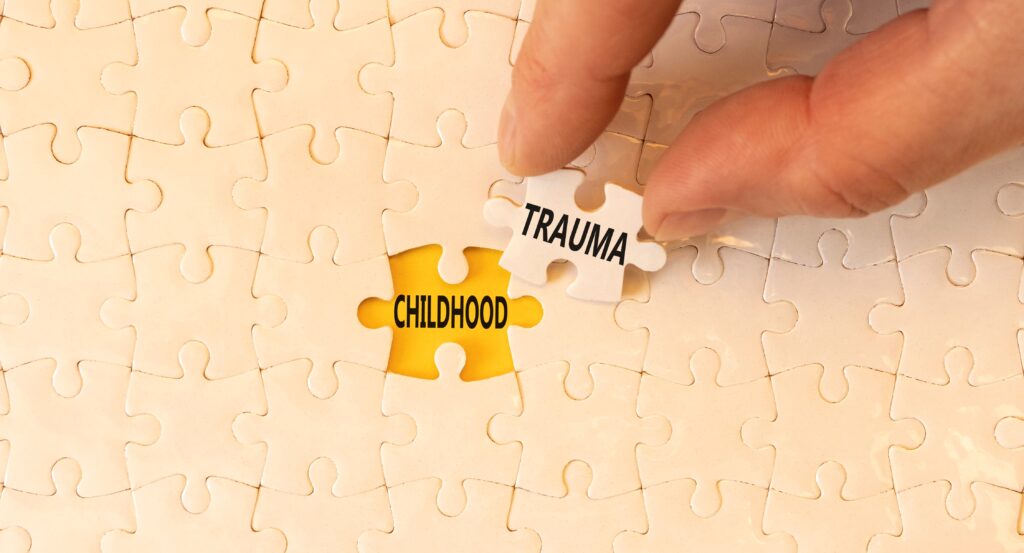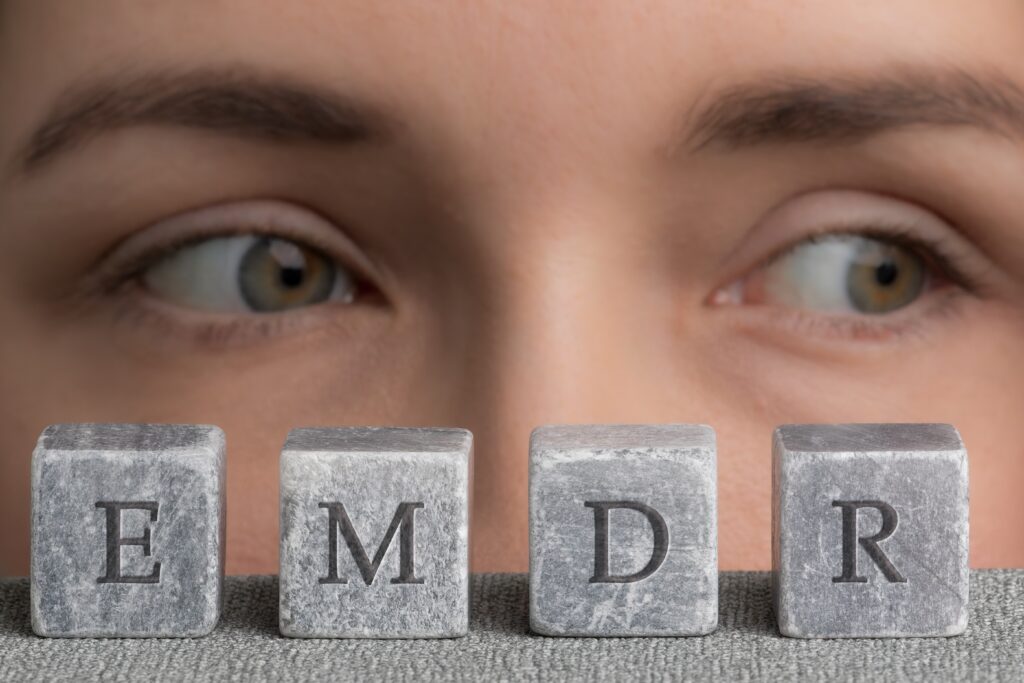Eye Movement Desensitization and Reprocessing (EMDR Therapy)
Trauma: an overused word or an under-recognized reality?
Do certain events in your present life trigger strong reactions? Do you become shut down or become angry quickly? Are your loved ones telling you that you ‘overreact’ to what are minor situations from the outside? It could be that your body and brain are reacting to a pocket of unprocessed trauma or grief from your past. Negative beliefs or thoughts about yourself often plague your daily life, affecting your relationships with loved ones and your performance at work.
While you seem to have it all together on the outside, something on the inside feels broken. The shelf life of minimizing your past, denying the impact of your childhood, or numbing the pain may be running out. Despite what you were taught, time doesn’t heal all wounds, and traditional talk therapy often isn’t enough. If this sounds familiar, then you are in the right place!
At East Cobb Relationship Center, several therapists are trained or certified in Eye Movement Desensitization and Reprocessing (EMDR). EMDR therapy is an empirically validated trauma treatment that helps provide relief and get you on a path to healing.

Not All Trauma is Seen
At East Cobb Relationship Center, we know that trauma can come in various forms. Six common types of traumas are: abuse, abandonment, neglect, betrayal, enmeshment, and direct or indirect exposure to life-threatening circumstances. Some traumas are more overt and easily identifiable, such as the betrayal of a spouse, physical or sexual abuse, or being the victim of a violent crime.
Other traumas are more subtle, such as emotional abuse, abandonment, or enmeshment. The chronicity of these traumas adds up and takes a toll on our nervous systems and bodies. You may not be able to point to a specific moment, but your body remembers, and the impact of unseen traumas can be just as severe.
How Does EMDR Therapy Help?
The therapists at ECRC are here to help you heal and improve your relationships with people, substances, food, and processes. We want you to feel more empowered and confident. Helping bring all your resources to deal with the reality in front of you. Sometimes, talk therapy is just not enough.
To live confidently in the reality of life, you need to overcome the negative thoughts, past hurts, overwhelming anxiety, and other mental health concerns that have been holding you back. The problem is that nothing you’ve tried so far has helped you find relief. This has left you feeling somewhat hopeless. We believe you deserve to feel better. You deserve help that truly works.
Our therapists have a deep understanding of trauma and the impact in has on the quality of life and relationships. If you are stuck in unconscious patterns or held back by subtle limiting beliefs that you wouldn’t admit out loud. We want to help you cope with your past to live fully in the present.

What is EMDR Therapy?
Eye Movement Desensitization and Reprocessing Therapy, or EMDR, is a set of standardized trauma and anxiety treatment protocols.
During EMDR, your clinician at East Cobb Relationship Center will work with you to ensure your safety at every phase of the process. Your safety and comfort are of tantamount importance, and you will never be pressed to disclose any events or memories that you do not want to disclose. One of the benefits of EMDR is that reprocessing can occur without having to retell details of traumatizing events.
EMDR consists of a structured eight-phase approach, which includes:
- History-Taking and Treatment Planning: The therapist gathers information about the client’s history and identifies target issues for EMDR treatment.
- Preparation: The therapist educates the client about EMDR and helps them develop coping strategies to manage emotional distress during the process.
- Assessment: Specific target memories are selected for reprocessing, and the client is asked to identify the negative beliefs associated with those memories.
- Desensitization: The client focuses on the distressing memory while simultaneously engaging in bilateral stimulation, typically through following the therapist’s hand movements or listening to auditory cues.
- Installation: Positive beliefs are reinforced to replace the negative ones associated with the targeted memory.
- Body Scan: Any remaining physical tension or discomfort is addressed to ensure complete desensitization.
- Closure: The client is helped to return to a state of equilibrium, and homework assignments may be given to reinforce the therapy’s effects.
- Reevaluation: In subsequent sessions, the therapist assesses progress and adjusts the treatment plan if necessary.

What Mental Health Concerns Can EMDR Treat?
- Effective Treatment for PTSD: EMDR Therapy has been extensively researched and is recognized as one of the most effective treatments for PTSD. It can significantly reduce the symptoms associated with traumatic experiences, such as flashbacks, nightmares, and anxiety.
- Rapid Results: Compared to traditional talk therapy, EMDR Therapy often yields quicker results. Clients may experience relief from distressing symptoms in a shorter time frame.
- Versatility: While EMDR Therapy is renowned for its effectiveness in treating trauma, it is also used to address a wide range of issues, including anxiety disorders, depression, phobias, and even performance anxiety.
- Minimally Invasive: EMDR Therapy does not require clients to delve deeply into their traumatic memories, making it less emotionally taxing than some other therapies.
- Long-Lasting Effects: EMDR’s benefits are often long-lasting, as the reprocessed memories lose their emotional charge, reducing the likelihood of relapse.
- Enhanced Emotional Resilience: By reprocessing negative memories and beliefs, EMDR Therapy can help individuals build emotional resilience, enabling them to better cope with life’s challenges.
- Reduction in Physical Symptoms: EMDR Therapy has been found to alleviate physical symptoms associated with psychological distress, such as chronic pain and tension.
- Improved Self-Esteem: As negative beliefs are replaced with positive ones, individuals often experience improved self-esteem and self-worth.
- Non-Drug Approach: EMDR Therapy is a non-pharmacological therapy, which means it does not rely on medication to achieve results, making it an attractive option for those who prefer drug-free treatments.
How Long Does EMDR Therapy Take?
A typical EMDR therapy session lasts from 60 to 90 minutes. Sometimes, it can take several sessions to process a traumatic experience or memory. The total number of sessions varies depending on your experience and history. The goal of EMDR therapy is to process memories, present disturbances, and future actions. Establishing trust in your therapist and the process is important before beginning the EMDR therapy. You will not begin processing traumatic experiences immediately. You and your therapist will take time to identify the problem and make sure you are resourced with coping skills to handle strong emotions. After you feel resourced enough to beginprocessing, you will then take time to decide which memories and experiences need processing and the order in which to process them. EMDR should feel safe and you will not be asked to go faster than you feel comfortable. You are in control during the entire time of your EMDR therapy and can stop the processing at any time.
The therapists at East Cobb Relationship Center will work hard to ensure we work at a pace that is comfortable and safe for you.

What Does “Processing” Mean in EMDR Therapy?
There are eight phases to the processing during EMDR Therapy. For an overview of the eight phases, please click here for a downloadable handout. During these eight phases, you and your therapist will work to set up a learning state that allows you to learn from past experiences and store them in your brain in a way that will help you in the future.
Negative emotions, beliefs, feelings, and behaviors caused by unresolved earlier experiences can keep us stuck or repeating choices that move us in the wrong direction. The goal of EMDR therapy is to help you develop healthy understandings and perspectives that can serve you rather than hold you back.
EMDR affects the way the brain processes information. A traumatized brain cannot process information as it would normally. Instead, it passes everything through a filter of unsafe or overwhelming past experiences.
Moments from the past become “stuck” in the mind and can lead to reexperiencing the trauma again. Sounds, smells, or images can trigger this trauma response.
After a successful course of EMDR therapy, the brain is freed to allow past events to remain in the past. You will remember a successfully processed event, but the former reactivity will be gone or significantly muted. This frees up resources for responding to stressors in the present without relieving the past.
Where Can I Learn More About EMDR Therapy?
A great resource to learn more about EMDR therapy is EMDR International Association. The EMDR International Association (EMDRIA) is a foundational training organization for therapists trained in EMDR and contains resources for both clients and clinicians.

Why Should I Come to East Cobb Relationship Center for EMDR?
At East Cobb Relationship Center, our therapists put YOU first. We are highly trained and committed to continuing education to help you ease your pain and improve the quality of your life. We follow well-researched trauma protocols through EMDR and help clients from all over Georgia feel better.
We know it’s scary to enter a therapy office, whether in-person or virtual, for the first time. Our therapists work to create a safe and supportive place to guide you on your healing journey. We want to help you find healing as quickly as possible. East Cobb Relationship Center exists to help you heal.

Begin EMDR in East Cobb and Marietta, or anywhere in Georgia via online therapy.
You don’t have to keep living within the limits your past experiences have placed upon you. When you’re ready to get started, we’re ready! You can learn more about our team of caring therapists by contacting East Cobb Relationship Center. Here are the steps you need to take to start anxiety treatment:
- Fill out the contact form below or email us at info@eastcobbrelationshipcenter.com.
- Next, one of our caring and competent therapists will respond to your inquiry within one business day to set up your appointment.
- Then, it’s time to begin healing and bring balance to your life and relationships.
EMDR therapy in Georgia does more than teach ways to cope. Our Georgia therapists help to reshape your relationship with anxiety, whatever form it may take, and help you regain your quality of life.
Life is overwhelming. We are here to help.
Other Counseling Services
We know that mental health is important and challenges many. Therefore, EMDR therapy in Georgia isn’t the only thing that East Cobb Relationship Center offers. We also offer effective counseling for adults, teens, and young adults suffering from eating disorders, depression, compulsive sexual behavior, and enmeshed men. Our therapists also specialize in couples counseling, emotionally focused therapy, and affair recovery.
